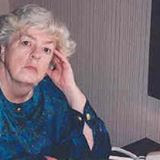Reducing Risk for Dementia
January 7, 2018 | Author Friend Promo
from Eris Field
No greater love hath man than to give of himself to help others and one of the greatest gifts one can give is to help families reduce the risk of developing dementia.
 |
| Photo Courtesy of geralt pixabay.com |
Dementia—characterized by impaired functioning such as problems with thinking and memory—is often also associated with changes in mood and personality, difficulty with self-care, and decline in ability to work. Everyone is affected when a family member develops dementia. Those who provide care are often spouses or adult children (Eighty percent of those with dementia receive care from a family member). Suddenly, without knowledge or training, they must deal with the responsibility of caring for someone with cognitive, emotional, and behavioral problems. Caregivers often experience increased health problems—hypertension, loss of sleep, poor diet, anxiety, depression, and loneliness—as well as increased expenses and decreased income if they have to cut back on work hours. They may be unable to save for retirement or their children’s education and sometimes they are forced to take early retirement in order to provide care.
Reducing the likelihood of a family member developing dementia should be a top priority for all. At this time, emphasis rests on changing the factors that increase the risk for developing dementia. Some risk factors can be modified and some—age, gender, and genetic influence– cannot. The greatest risk factor, advanced age, cannot be modified. The rate of dementia is higher in women and this risk factor cannot be changed. Genetic influences such as having the apolipoprotein gene with the e4 allele (APOE e4) that increases vulnerability for the development of Alzhemier’s disease, a form of dementia, cannot be changed; however the risk bestowed by the APOE e4 gene may be influenced by other risk factors. Risk factors that can be modified include events, conditions, or life style practices present in middle adulthood, years before the onset of dementia, and some risk factors that occur in old age.
Factors found to be associated with the development of dementia that occur in middle age include: physical trauma to the head; untreated hypertension; diabetes mellitus; high total cholesterol; obesity; smoking; coronary artery disease; physical, mental, and social inactivity; and lack of social support. Among older people, additional factors include: stress, depression, social isolation, and loneliness.
Factors associated with a lower risk of developing dementia include:
1. Not smoking or smoking cessation
2. Maintaining normal weight
3. Engaging in mental activities (hobbies, home maintenance, be active in a social circle, parties, and games
4. Participating in physical activities
5. Moderate use of alcohol
6. Follow a Mediterranean diet
Although there has not been any study proving that a Mediterranean diet reduces the risk of developing dementia, compelling evidence has been presented that those who follow a Mediterranean diet have a lower rate of developing dementia. There are variations in Mediterranean diets but the basic diet consists of:
1) A daily intake of: Fruits, non-starchy vegetables, salads with olive oil and lemon juice dressing, whole grain breads and cereals, beans or lentils, nuts, and seeds
2) Use of unsaturated fatty acids such as olive oil instead of butter or margarine
3) Twice weekly intake of fish (fresh salmon, mackerel, herring, albacore tuna, sardines, or anchovies) and poultry
4) Use of low-fat dairy products such as low-fat milk, cheese and yogurt
5) Restriction of red meat to a small low fat serving a couple times a month
6) Avoidance of sugar, processed foods, and trans fats
7) Moderate amounts of red wine
8) Some diets include: One to two cups of black coffee each day
Reducing the risk of developing dementia is a priceless gift for the family and for society.
At some time in our lives, many of us will be refugees–people fleeing from traumatic situations such wars, earthquakes, fires, floods, or the aftermath of debilitating illness, death, divorce or betrayal. Help for some may come from family members, friends, and spiritual leaders. Within the medical profession, it is often psychiatrists who help those who have been traumatized by such events. No Greater Love is a contemporary, international romance featuring a psychiatrist and a nurse who help those who are refugees only to discover that they are the only ones who can save each other. The story moves from East Aurora in Western New York to Leiden and Amsterdam in The Netherlands.
Descended from legendary Circassian beauties once sought for Sultans’ palaces, Janan, a survivor of an earthquake in Turkey that killed her family when she was eight years old, was adopted by an older, childless couple in East Aurora. Her adoptive father was raised with a cousin, Carl, who, in 1939 at the age of 5, had been sent from his home in Leiden by his Dutch-Jewish father to his uncle in the US to save him from Nazi occupation of The Netherlands. Now, 28 years old, Janan has spent her life working as a nurse, caring for her parents, and, after their deaths, helping the aging Carl.
When Pieter, a young Dutch psychiatrist who Carl mentored, comes to Buffalo to be evaluated at Roswell Park Cancer Institute, he meets Janan and knows the sweet power of love for the first time. He also knows that, even if he lives, treatment for leukemia may leave a man unable to father children.
Realizing she has fallen in love with Pieter and fearing that life is passing her by, Janan asks him for one night. During that one night, cloistered in Room 203 of the venerable Roycroft Inn, Pieter teaches Janan the eight different kisses of seduction. It is a night that changes the lives of all.
Eris Field was born in the Green Mountains of Vermont—Jericho, Vermont to be precise—close by the home of Wilson Bentley (aka Snowflake Bentley), the first person in the world to photograph snowflakes. She learned from her Vermont neighbors that pursuit of one’s dream is a worthwhile life goal.
As an impoverished student nurse at Albany Hospital, Eris met her future husband, an equally impoverished Turkish surgical intern who told her fascinating stories about the history of Turkey, the loss of the Ottoman Empire, and the painful experience of forced population exchanges.
After years of working as a nurse, teaching psychiatric nursing, and raising a family, Eris now writes novels–international, contemporary romances that incorporate her interest in psychiatry, history, people from different cultures, and the problems of refugees.
Although the characters in Eris’s novels are often from other countries—The Netherlands, Turkey, and Kurdistan— her novels are usually set in Western New York–The land of Father Baker, Jericho Road Refugee Center, the Buffalo Bills, Wings, and snow–chunky rain snow, lake-effect snow, horizontal snow, the snow of thunder snow storms, dry, fine snow, curtains of wet heavy snow, and whiteouts.
Learn more about Eris Field on her website. Stay connected on Facebook.






